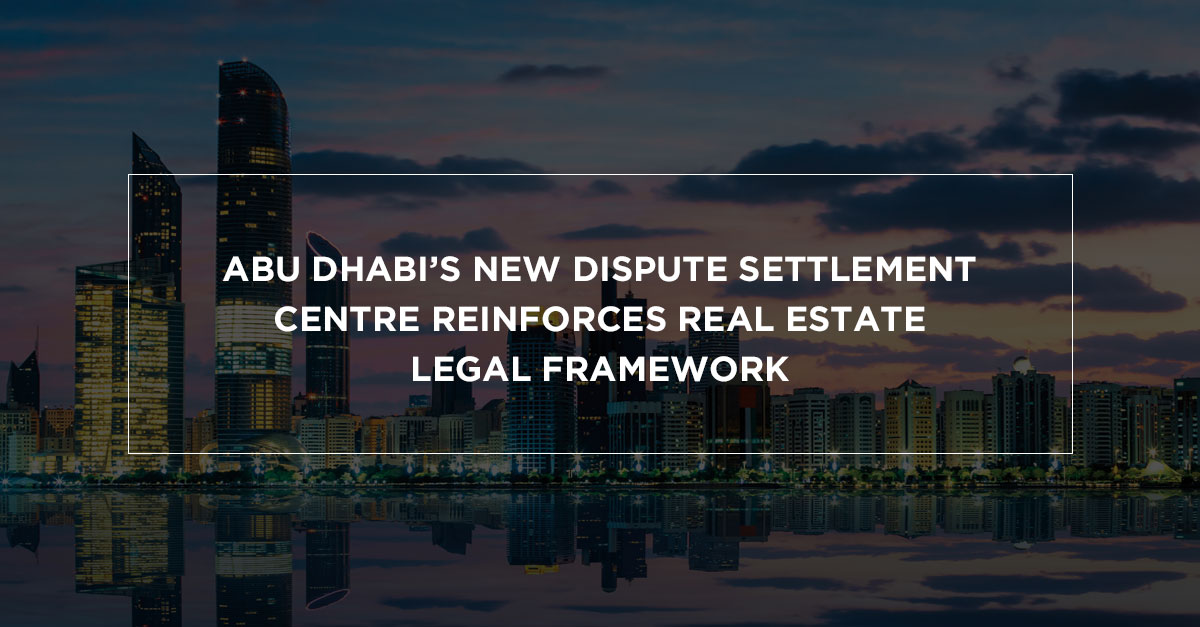Abu Dhabi’s new dispute settlement centre reinforces real estate legal framework
According to Bayut, a leading property portal in the UAE, monthly views for properties in Abu Dhabi are steadily increasing since May. In two months, Bayut has witnessed a total traffic of five million views for its property listings in Abu Dhabi(1).
This surge in interest can be attributed to many reasons, including administrative reforms and the onset of a post-pandemic revival. But most importantly, the achievable rental yield is being identified as the most stimulating incentive for investors, especially on the back of softening prices. As per research released by Knight Frank, the Abu Dhabi market has registered an average gross yield of 6.8%, up from 6.6% for the previous year(2). This is remarkable amid the muted economic growth and downturn in real estate markets around the globe, due to the COVID-19 pandemic, and its knock-on impact.
These figures also validate the view of the UAE government and industry affiliates, which have identified real estate as a key catalyst to the nation’s overall economic growth. Their confidence has been evident in the range of legislation announced to reinforce a favourable regulatory framework, aimed at further supplementing the real estate sector and its sub-markets. And the latest addition of a new dispute settlement centre, for Abu Dhabi, is their way of indicating that such support is a long-term commitment.
Abu Dhabi Real Estate Dispute Settlement Centre: Functions and objectives
Following a joint agreement signed between the Abu Dhabi Judicial Department (ADJD) and the Department of Municipalities and Transport (DMT), a dedicated dispute settlement centre has come into being. This new department will now work to settle rental and other real estate-related disputes in Abu Dhabi, as per reports(3). Previously, such disputes were handled by the ADJD, while DMT was in-charge of “Tawtheeq”, a system for tenancy contracts.
In essence, the new dispute settlement centre is an intermediary, entrusted to foster reconciliation between litigants and help settle disputes amicably. This initiative is part of the larger ongoing restructure of the national judicial system. If the dispute is settled at the centre, a reconciliation agreement is drawn and sent to the judges for approval. In case it remains unsettled, the case is then referred to ADJD for further hearing. This begs the question: How does it benefit the industry at large?
The agreement between ADJD and DMT also extends to the development of a new class of conciliators, through training and accreditation, with the new centre facilitating the process. In the due course of time, the new system is expected to churn out a group of well-qualified and experienced conciliators, who can add legislative value to the industry, by safeguarding the interests of all stakeholders.
Also, the new centre provides an opportunity for litigants to settle arbitral cases before it goes to court, which not only expedites the legal proceedings, but also reduces the load on ADJD and higher courts. This added judicial layer will further reinforce investment security, and thereby enhance business competitiveness and attractiveness of the real estate industry. And in a market driven by demand rather than supply, initiatives such as this is pivotal to encourage prospective buyers. Even the general glut in the Abu Dhabi market finds solutions in initiatives that support the demand-side economics, especially taking into account that over 8,600 units are scheduled to be delivered in 2020.
Abu Dhabi real estate: Gearing up for growth
With the deployment of “Gahdan 21”, Abu Dhabi’s accelerator programme, gaining momentum, and with the ambiguities surrounding the freehold ownership law finding clarity, Abu Dhabi’s real estate market is poised for steady growth in the post-COVID economic cycle.
The growth prospects are further complemented by UAE Central Bank’s stimulus package, aimed at strengthening the financial market. The increase in banks’ exposure to real estate, along with increase in loan-to-value ratios by 5% for first-time buyers, could fuel the homebuying aspirations of many, particularly from the vast middle-class segment. The current, decade-low borrowing rates, too, could be a key driver.
In addition, according to multiple research bodies, the easing of visa regulations and the introduction of golden visa residency schemes are proving to be an unique selling point, unmatched by any other global competitive markets. In fact, the new residency visa for overseas remote working professionals, to relocate and live in the UAE, while continuing employment with foreign organizations, is a testament to the nation’s proactive strategy of enticing global investors(4). This move coincides a juncture when remote working is becoming the new normal.
Be it the new visa programme or the new dispute settlement centre, such initiatives have implications in the real estate sector. Also, the current sliding economy is ideal for making structural fixes, tying loose ends and setting up for long-term success, with minimal disruptions and consequences. To that end, the responsive and collaborative effort from DMT and ADJD, to set up an added judicial layer, is as timely as it is commendable.
- https://www.bayut.com/mybayut/q1-2020-market-report-property-prices-abu-dhabi/
- https://content.knightfrank.com/research/1413/documents/en/uae-residential-market-review-q2-2020-7288.pdf
- https://gulfnews.com/uae/abu-dhabi-to-get-new-department-to-settle-real-estate-disputes-1.73801514
- https://gulfbusiness.com/dubai-launches-new-residency-programme-for-overseas-remote-working-professionals/




